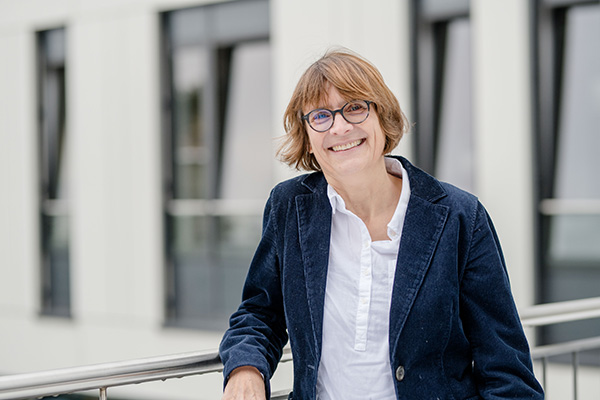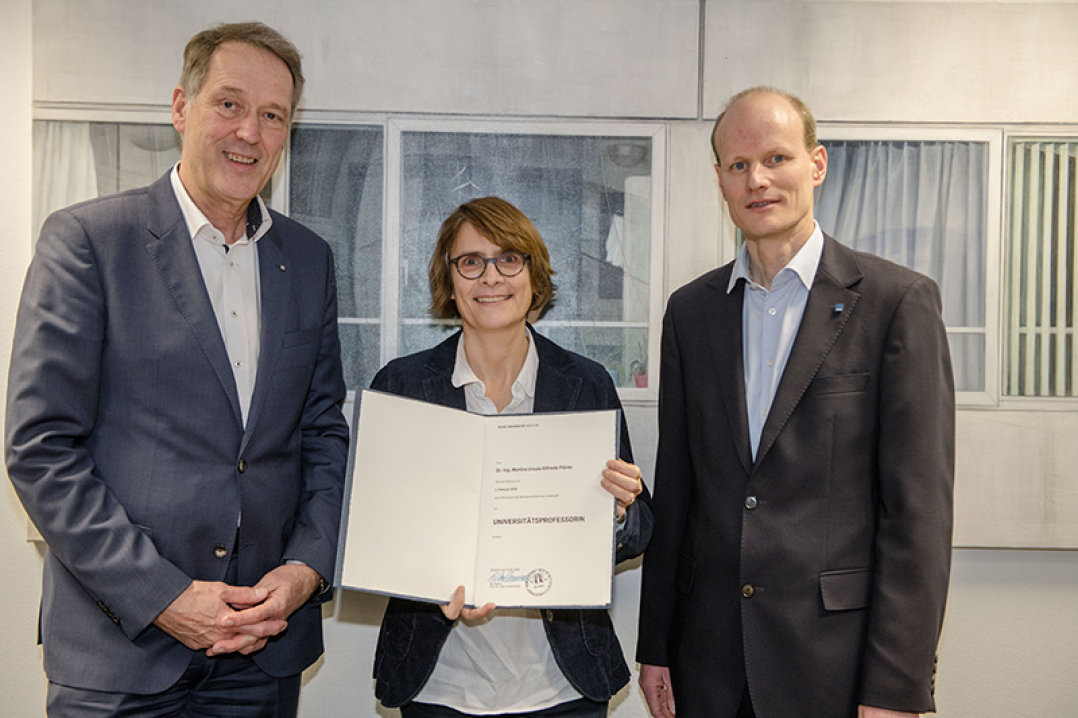19.03.2019

Prof. Dr.-Ing. Martina Flörke (formerly University of Kassel) succeeds Prof. Dr. rer. nat. habil. Andreas H. Schumann and now heads the Chair of Engineering Hydrology and Water Management. At the start, she answered questions from the PR team about her research areas, her motivation and her plans for the future.
Before Prof. Dr.-Ing. Martina Flörke began her work at the Chair of Engineering Hydrology and Water Management on 01.02.2019, she headed the research group "Global and Regional Dynamics" (GRID) at the Center for Environmental Systems Research at the University of Kassel. Her research focuses on identifying and quantifying the consequences of global change for the environment and society, especially with regard to the quantity and quality of surface waters. The main objective is to develop strategies to help avoid negative impacts. She also worked as a senior scientist on the development of the global water modelling system WaterGAP3. Prof. Dr.-Ing. Flörke gained extensive experience in international and European research projects and was involved in a number of interdisciplinary projects dealing with scenario assessments (e.g. "Millennium Ecosystem Assessment", "Global Environment Outlook 4") as well as water and climate issues. The faculty's PR team wanted to know more about her and asked her questions about research, studies and future perspectives.
What areas of research will you be dealing with from now on?
The starting point of my work is the hypothesis that the anthropogenic influence of water use and pollution on the water cycle is of far-reaching importance for the future availability of this resource. Too many nutrients and chemicals in the environment threaten food security, human health and ecosystems. Pollutants from point and diffuse sources can be found in watercourses and groundwater and represent a challenge for water management. Model- and data-driven studies support a better understanding of the interaction of different water use sectors as well as the characterisation of pollutant sources and input paths, fate and behaviour of substances in surface and groundwater bodies. Models help to identify "hotspots", assess impacts and develop solutions to reduce or prevent water scarcity or pollution.
My second field of research comprises the application of the developed models, e.g. to questions of the sustainable use of water resources under conditions of global change. Global change and the resulting consequences for humans and the environment require the development of solution strategies for adaptation and mitigation. Drinking water treatment, water supply, wastewater discharge and wastewater treatment are measures that are essential to achieve the goal, but require a comprehensive assessment of pressures and impacts.
I have worked on the development of the global water model WaterGAP3 over the last 10 years and would like to further develop the model at my chair to apply it across scales, from the regional to the global scale. Many water-related issues can be located supra-regionally or globally, such as major transitions to urban supply or food production.
How did you come to engineering? Was it your plan from an early age to go into a technical field of work?
Actually, I came to civil engineering by a detour. I actually intended to study architecture, but then found the handling of numbers and technology much more interesting. In addition, I have a family background, because both my father and my brother were civil engineers. When there was something to build at home, I was always there. That shaped me.
For me, engineering means "planning, solving, implementing". The topics are complex and interdisciplinary, the solutions require comprehensive and systemic considerations, the implementation requires transdisciplinary formats. I find this mixture very exciting and the engineering sciences are ideal for working or researching in these fields.
What are your tips for successful studies?
You should do what you want to do, set concrete goals and face new challenges. It is often very rewarding to think outside the box.
Keyword Future Plans: What do you want to realize in the next years?
In the field of research, I naturally aim to further develop the model in order to be able to answer hydrological and water management questions on different scales. In particular, I would like to advance the simulation of new substances in surface waters and their effects on aquatic ecosystems and human health. Small-scale processes have to be scaled on a large scale; this is a methodological challenge.
In the field of teaching, I would like to emphasize the importance of water as a resource, because it is at the centre of sustainable development and is important for socio-economic developments, ecosystems and human health. From a systemic point of view, however, water is also at the centre of adaptation to climate change and is the crucial link between the climate system, human society and the environment.
The faculty welcomes Prof. Dr.-Ing. Martina Flörke!
Prof. Dr.-Ing. Martina Flörke (formerly University of Kassel) succeeds Prof. Dr. rer. nat. habil. Andreas H. Schumann and now heads the Chair of Engineering Hydrology and Water Management. At the start, she answered questions from the PR team about her research areas, her motivation and her plans for the future.
Before Prof. Dr.-Ing. Martina Flörke began her work at the Chair of Engineering Hydrology and Water Management on 01.02.2019, she headed the research group "Global and Regional Dynamics" (GRID) at the Center for Environmental Systems Research at the University of Kassel. Her research focuses on identifying and quantifying the consequences of global change for the environment and society, especially with regard to the quantity and quality of surface waters. The main objective is to develop strategies to help avoid negative impacts. She also worked as a senior scientist on the development of the global water modelling system WaterGAP3. Prof. Dr.-Ing. Flörke gained extensive experience in international and European research projects and was involved in a number of interdisciplinary projects dealing with scenario assessments (e.g. "Millennium Ecosystem Assessment", "Global Environment Outlook 4") as well as water and climate issues. The faculty's PR team wanted to know more about her and asked her questions about research, studies and future perspectives.
What areas of research will you be dealing with from now on?
The starting point of my work is the hypothesis that the anthropogenic influence of water use and pollution on the water cycle is of far-reaching importance for the future availability of this resource. Too many nutrients and chemicals in the environment threaten food security, human health and ecosystems. Pollutants from point and diffuse sources can be found in watercourses and groundwater and represent a challenge for water management. Model- and data-driven studies support a better understanding of the interaction of different water use sectors as well as the characterisation of pollutant sources and input paths, fate and behaviour of substances in surface and groundwater bodies. Models help to identify "hotspots", assess impacts and develop solutions to reduce or prevent water scarcity or pollution.
My second field of research comprises the application of the developed models, e.g. to questions of the sustainable use of water resources under conditions of global change. Global change and the resulting consequences for humans and the environment require the development of solution strategies for adaptation and mitigation. Drinking water treatment, water supply, wastewater discharge and wastewater treatment are measures that are essential to achieve the goal, but require a comprehensive assessment of pressures and impacts.
I have worked on the development of the global water model WaterGAP3 over the last 10 years and would like to further develop the model at my chair to apply it across scales, from the regional to the global scale. Many water-related issues can be located supra-regionally or globally, such as major transitions to urban supply or food production.
How did you come to engineering? Was it your plan from an early age to go into a technical field of work?
Actually, I came to civil engineering by a detour. I actually intended to study architecture, but then found the handling of numbers and technology much more interesting. In addition, I have a family background, because both my father and my brother were civil engineers. When there was something to build at home, I was always there. That shaped me.
For me, engineering means "planning, solving, implementing". The topics are complex and interdisciplinary, the solutions require comprehensive and systemic considerations, the implementation requires transdisciplinary formats. I find this mixture very exciting and the engineering sciences are ideal for working or researching in these fields.
What are your tips for successful studies?
You should do what you want to do, set concrete goals and face new challenges. It is often very rewarding to think outside the box.
Keyword Future Plans: What do you want to realize in the next years?
In the field of research, I naturally aim to further develop the model in order to be able to answer hydrological and water management questions on different scales. In particular, I would like to advance the simulation of new substances in surface waters and their effects on aquatic ecosystems and human health. Small-scale processes have to be scaled on a large scale; this is a methodological challenge.
In the field of teaching, I would like to emphasize the importance of water as a resource, because it is at the centre of sustainable development and is important for socio-economic developments, ecosystems and human health. From a systemic point of view, however, water is also at the centre of adaptation to climate change and is the crucial link between the climate system, human society and the environment.
The faculty welcomes Prof. Dr.-Ing. Martina Flörke!

